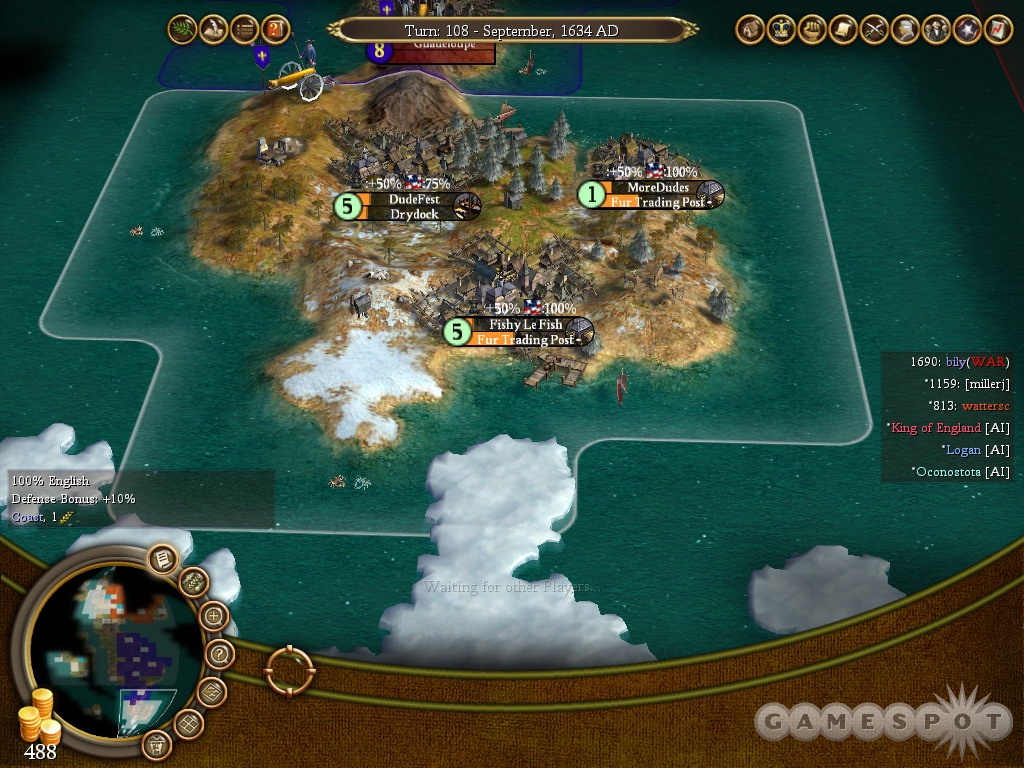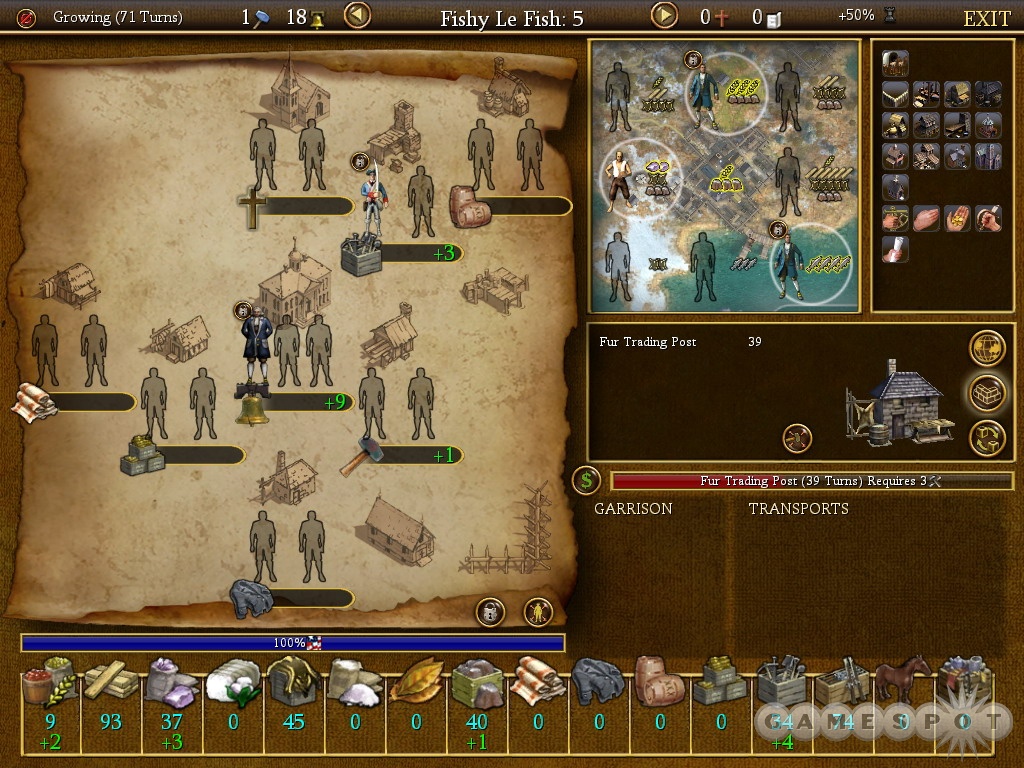Civilization IV: Colonization Multiplayer Hands-On
The New World isn't any easier with friends, but it's more fun.
If there's one thing settlers learned as they colonized the New World, it's that you always need a little help from your friends. Be it in the form of corn-farming lessons from the natives or an extra shipment of supplies from the homeland, a helping hand could ensure survival through a harsh winter in a strange new land. With that in mind, Civilization IV: Colonization is a strategy game more focused on trade and forging new alliances than it is about wiping out natives and competing colonies with musket fire.
We learned this lesson playing a LAN multiplayer match of Colonization this week. In addition to traditional LAN play and online modes, there's a direct IP connection, a hot seat mode in which multiple players take their turns on the same computer, and a slower-paced play-by-e-mail mode for those who don't have four hours to spare for the quick game. Yes, that's four hours for a quick game.

We took control of Samuel de Champlain set off in hopes of establishing a fruitful French colony, and quickly began construction on Quebec in the Southern Hemisphere. The Cherokee and the Arawak tribes were both located in close proximity, but gifts of rum and tools kept them happy neighbors. Keeping the natives happy, you'll quickly learn, is of immense importance in Colonization. What their villages lack in technology is offset by the huge combat advantage braves have in the forests, swamps, and hills. Building too closely to their villages is the easiest way to start a costly war that, early on in the game as you don't have many guns, you will lose.
It wasn't long before we ran into a village belonging to the English—controlled by another player. The city was low on resources, and it was the hope of that player that founding near our border would stymie our nation’s growth. In a way, this worked, because as it turns out, you can place citizens in your city’s town hall to increase patriotism. This caused the small borders of the city to expand so that several production squares in our city, Montreal, were cut off.
At the same time in the far north, another of our opponents, playing as the Dutch, was growing his holdings at a tremendous pace. The Dutch begin the game with advantages in trade, such as the Merchantman ship class from the opening of the match, and the colonies' treasury was filling quickly by trading raw silver and fur coats. However, we did commission a privateer unit to start raiding these wealthy Dutch ships for their goods. Privateers sail without their nation's colors, so they can attack without declaring war. Utilizing privateers in multiplayer is a fun way to pester your opponents without entering a costly war.
By building up your resources early in the game, you can focus on weapons production later during the endgame. Early on it seems the best strategy is to offer open trade borders to your counterparts, even building an alliance when your king eventually sends its expeditionary force after you when you declare independence.
With France’s skilled lumberjacks and carpenters, we constructed new buildings at a rapid pace. With expert iron ore miners, blacksmiths, and gunsmiths, tools and weapons became widely available through our domain. In another of our nearby cities, we ordered pioneers to improve the land by building lodges, mines, farms, and roads--this increases the amount of resources produced, and also decreases the time it takes to transport goods overland via wagon train. The French faction seems to have the ability to build a powerful economy indeed--we were also able to commission expert silver miners to producing staggering amounts of the precious metal. We then shipped the silver back to our home nation of France to purchase elder statesman and master tobacconists. Elder statesmen in city hall increase production of liberty bells that increase rebel sentiment--necessary to declare independence from your home nation later in the game--as well as increase the size of territory belonging to your nation. When your nation possesses enough influence--especially when you commission such powerful helpers to your cause--your borders can eventually come to surround several Native American villages. In this case, the chiefs of the villages we surrounded offered the settlements as gifts to our cause and relocated to the west. Tobacconists, naturally, produce tasty cigars that can be sold in Europe for a tidy profit
Over time, we developed our colony and attracted powerful founding father characters like Patrick Henry and Martha Washington. However, we remained mindful of the number of turns we had remaining in the game, since the ultimate goal of the game is to build your fledgling settlements into a nation that’s powerful enough to fight off the advances of your home country and declare independence. In fact, this end game provides the most difficulty in Colonization. As rebel sentiment in our colonies grew, the king of our home nation of France added soldiers, artillery, and warships to his expeditionary forces. We found our own forces to be woefully inadequate in comparison, but rebel sentiment in our colonies had eclipsed 50 percent. Rebel sentiment increases over time as your home nation levies more and more usurious taxes from your overworked colonists. In our case, the tax rate soared to 25 percent and our elder statesmen finally clamored for revolution.
And so, we declared our independence in the game year of 1755 and formed a new nation. When you take this bold step in Colonization, you must draft a constitution that declares a decisive direction for your new nation. This includes whether or not your nation will allow for slavery, whether it will subscribe to the belief of Manifest Destiny (versus rights for the natives), and whether you wish to have separation of church and state (versus a theocracy). Each of these decisions offer a variety of bonuses. For instance, you’ll have more production if you adopt slavery, but you have increased combat strength if every man is created equal. After crafting the constitution, our citizens were ready for a new beginning without taxes and tyranny. They were ready for a new country. And in the game year of 1762, just seven turns later, they were squashed flat

What separates Colonization from other strategy games is that it’s really two games in one. 90 percent of the game is spent cultivating resources, building cities, and increasing rebel sentiment. The final turns are devoted to smashing the king's ground troops in order to claim independence. If you don’t develop a strong enough economy with a proud enough nation of people, you’ll never muster up a strong enough army. And if you don’t have a strong enough army, the government of your parent country will crush you. As we saw, this can be a tougher task in a multiplayer game where you not only have to contend with your greedy home nation’s king and his outrageous taxes, but also with rival players looking to carve out the New World in their images. However, the game’s multiplayer mode can accommodate as many as eight players total, and two players can cooperatively control a single colony. In any case, from what we can tell, Colonization will offer an intriguing and engrossing multiplayer experience if you and your friends can spare the time. The game is scheduled to ship later this month
Got a news tip or want to contact us directly? Email news@gamespot.com
Join the conversation